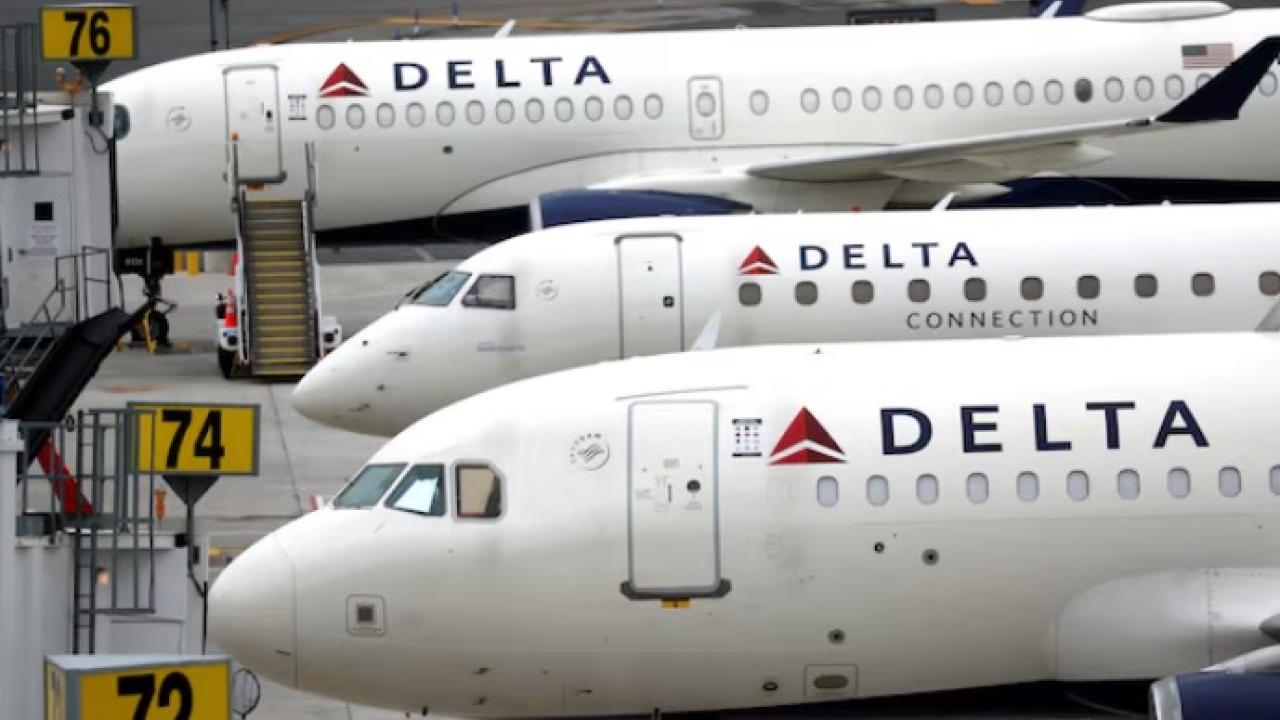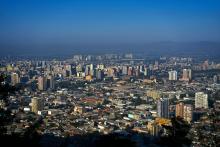
The US airline recognizes that the Latin market is crucial due to growing in both business and leisure travel. Its 2022 alliance with Latam is positioning it as the main airline operating on the Americas.
At an external temperature of -4 Celsius in the Newrest facilities, located in an industrial complex in the Pudahuel area, a short distance from the international airport of Santiago de Chile, a team of cooks prepares a dish of salmon and sautéed vegetables with almost scientific care. In another kitchen, a chef gives instructions to his assistants for a passion fruit mousse, while others assemble trays with prepared foods. There are hundreds of portions, matching quality and quantity, that the French firm works with clockwork precision for the catering of Delta's business class in the country.
Three types of menus are presented to the press during a tour specially designed to show the infrastructure of its kitchens, as well as the quality of ingredients and on-board service that the American airline provides to its passengers.
“Delta is differentiating and enhancing the customer experience with innovative, elevated products, options and solutions across the entire journey. Addressing what matters most to our customers is essential, and we are making the travel experience more fluid, pleasant and with less wait times,” Alex Antilla, vice president for Latin America at Delta Air Lines, explains to AméricaEconomía.
In October 2022, the American company signed a joint venture with the Chilean-Brazilian Latam for flights to and from North and South America in a specific group of markets: Chile, Brazil, Peru, Ecuador, Colombia and Peru.
This is the deepest level of alliance two airlines can have. It is not very common in Latin America, but Delta has other joint ventures around the world, including those with Korean Air for Asia, with Aeroméxico since 2016 for North America-Mexico flights, and with Air France KLM for Europe, the company explains.
“That means that we have the possibility of opening our books, our strategy, our prices and deciding together how we do the best possible business for the users of both airlines. And at the end of the day, what we win or what we lose on those routes is shared (…) and also includes loyalty programs,” says Soledad Lago Rodríguez, Director of Communications and Marketing for Latin America at Delta.
Before this deal, the airline operated 122 weekly flights between the United States and South America, but was not considered a market leader.
However, the integration with Latam has been a game changer, allowing the airline to strengthen its position in Latin America and improve its route network. That includes a night flight connecting Atlanta and São Paulo, a seasonal route between New York and Rio de Janeiro, and the resumption of the Atlanta-Cartagena route. It also offers the only non-stop flight between São Paulo and Los Angeles, along with new services from Lima to Atlanta or from Santiago to Orlando, in addition to the reactivation of the direct route between Santiago de Chile and Orlando, during the summer season.
“In 2023, the Delta-Latam partnership celebrated its first anniversary with impressive results: six new routes were launched, totaling 15,000 flights and serving more than 3 million passengers. We connect 300 destinations between North and South America,” highlights Alex Antilla, who pointed to last year as a record period “in terms of income and profitability” for the airline.
A MEANINGFUL ALLIANCE
“This joint venture makes a lot of sense,” says Rodrigo Urrutia, partner at Matrix Consulting . “It will improve the use of the local networks of both companies, improve load factors, and provide greater connectivity to passengers of both airlines, without competing with the increase in fleets.”
As a former planning analyst for the former LAN (the precursor of Latam), Urrutia sees this union between both companies as a means “for Latam to have better distribution in the United States, where Delta has its strength. It would not make sense for Latam to try to install a local network in the United States due to the size of that market and the level of competition that exists,” he details to AméricaEconomía .
Despite the good evaluation of the alliance with Latam, Delta is now considering that the United States Department of Transportation (DOT) will no longer consider its operations with Aeroméxico a monopoly risk.
In January of this year, the eventual termination of the antitrust immunity (ATI) of the Joint Collaboration Agreement (JCA) that the DOT granted to Aeroméxico for the alliance with Delta Air Lines was announced.
In mid-April of this year, Aeroméxico's Senior Vice President of Global Sales, Giancarlo Mulinelli, expressed optimism to the press that this impasse will be resolved favorably.
Delta was not as conciliatory, telling AméricaEconomía that it feels “deep disappointment” at the U.S. Department of Transportation's tentative decision to end its approval of the Joint Cooperation Agreement, as this unprecedented regulatory action “will cause significant harm” to consumers traveling between the United States and Mexico. "Mexico is our country's second largest trading partner and the Agreement (…) has been fundamental in connecting communities and businesses in both countries, generating substantial economic benefits for American companies," emphasized Alex Antilla.
In any case, he asserted that Delta will take “all necessary measures” to protect the millions of travelers who have benefited from its strategic partnership, ensuring the continued delivery of important benefits to consumers in the United States-Mexico market.
LATIN FLEET
Despite this headwind, Delta highlights the post-pandemic recovery of the Latin American market and the high interest in traveling, after years of confinement.
“In the regional context, the company is well positioned for a market that is always dynamic, demanding and requiring constant reinvention. It is a region where travel behavior is different, both in leisure and business segments. Many changes occurred after the pandemic and at Delta we adapt to changes in demand,” says Antilla.
The figures accompany them, with operating income of US$ 45.6 billion in 2022 (2% above 2019) and US$54.7 billion in 2023 (20% hithger than in 2022). “This notable recovery was achieved through significant improvements in service, the launch of new routes and the strengthening of commercial alliances, especially joint ventures,” says the company's vice president for Latin America.
Together with its passenger loyalty, technology and environmental initiatives (such as improved routes with updated navigation databases, reduced waste, weight and drinking water on board), Delta continues to invest in sustainable aviation fuel and is a member founder of the Minnesota SAF Hub, a large-scale project to increase sustainable aviation fuel production in the United States.
At the same time, the airline is in the process of upgrading and optimizing its fleet with the addition of 20 new wide-body, energy-efficient Airbus A350-1000 aircraft. This will be the largest and most capable aircraft in Delta's fleet, marking a significant step forward in its international expansion and featuring an enhanced customer experience, with more premium seats and expanded cargo capabilities.
Regarding the active fleet, there were 161 wide-body aircraft, 785 mainline narrow-body aircraft and 313 regional aircraft as of December 31, 2023.
“In 2024, we are committed to significantly improve connectivity and accessibility for travel, especially in South America. “Based on accelerated expansion in 2023, our focus for 2024 is to optimize the progress made so far (…) Additionally, one of our main initiatives for 2024 is to elevate Atlanta, both the airport and the city, as the main hub” , explains the executive.
The promotion of this hub is accompanied by a series of bilingual services on land and on board special for the Spanish-speaking Latin public. Efforts aim to create a welcoming and efficient experience for all travelers, especially those from the Latin community.
“Latin America is a crucial market for air travel, experiencing growth in both business and leisure travel due to economic development. Delta Air Lines recognized this strategic importance and sought to expand its presence in the region to meet growing demand,” concludes Antilla.










